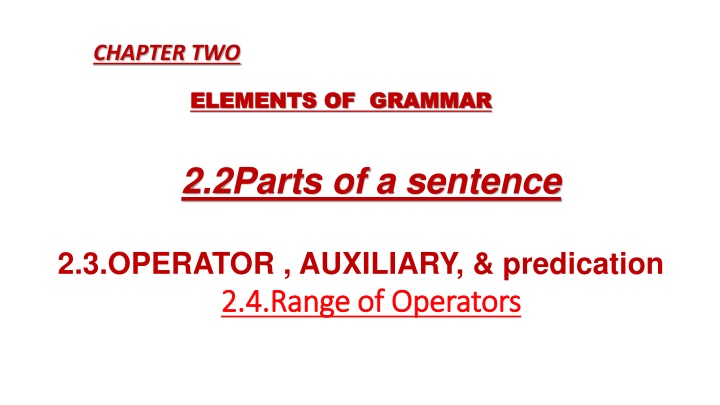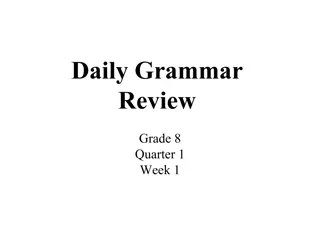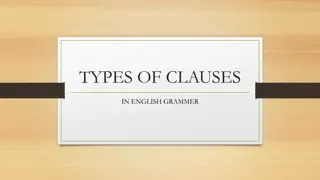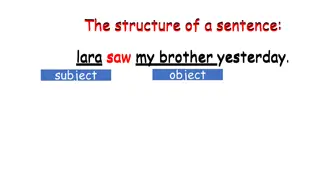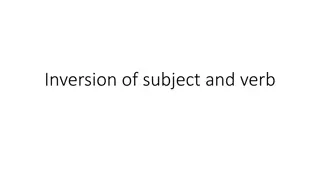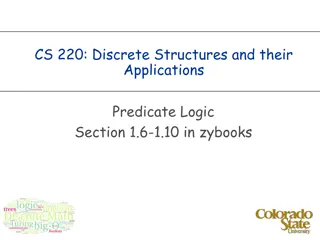Chapter Two: Elements of Grammar - Parts of a Sentence, Subject and Predicate
This chapter delves into the fundamental aspects of English structure, covering elements of grammar, sentence components, parts of speech, and the distinction between subjects and predicates. It explains how subjects determine verb concord and agreement, emphasizing the importance of matching singular subjects with singular verbs and plural subjects with plural verb forms.
Uploaded on Mar 03, 2025 | 3 Views
Download Presentation

Please find below an Image/Link to download the presentation.
The content on the website is provided AS IS for your information and personal use only. It may not be sold, licensed, or shared on other websites without obtaining consent from the author.If you encounter any issues during the download, it is possible that the publisher has removed the file from their server.
You are allowed to download the files provided on this website for personal or commercial use, subject to the condition that they are used lawfully. All files are the property of their respective owners.
The content on the website is provided AS IS for your information and personal use only. It may not be sold, licensed, or shared on other websites without obtaining consent from the author.
E N D
Presentation Transcript
CHAPTER TWO ELEMENTS OF GRAMMAR ELEMENTS OF GRAMMAR 2.2Parts of a sentence 2.3.OPERATOR , AUXILIARY,& predication 2.4.Range of Operators 2.4.Range of Operators
CHAPTER TWO : Elements of Grammar The Purpose of this ch is to explore :certain features of English structure. TOPICS COVERED IN THIS CHAPTER Elements of Grammar Sentence elements Parts of Speech Stative & Dynamic Pro-forms Question Negation
Parts of a sentence 2.2.Subject and Predicate In order to state general rules about the construction of a sentence, it is necessary to refer to smaller units. subject & predicate.
2.2.Subject & Predicate Examples: Subject [1] John [2] The girl [3] His brother [4] It [5] He [6] They elect him the chair every year Predicate carefully searched the room is now a student at a large university grew happier gradually rained steadily all day had given the girl an apple
The subject of the sentence has a close general relation to what is being discussed , the theme of the sentence, with the normal implication that something new (the predicate) is being said about a subject that has already been introduced in an earlier sentence. the predicate of the sentence The predicate is what is being said about the subject. In other words, it describes what is happening. It expresses the action the subject is taking or shares something more about the subject. The predicate will contain a verb in addition to a possible modifier. The main verb or the verb phrase Verb phrase= Auxiliary / helping verb + main verb
1.subject determines concord (p. 11); - *The subject determines concord / agreement: the form of the verb (singular/plural) depends on whether the subject is singular as in [2], *the girl is now a student at a large university, [2] or plural as in [6], * they elect him a chairman every year. *A basic principle here is the "subject-verb agreement": subjects and predicates must agree in number. In other words, singular subjects require singular verbs and plural subjects require plural verbs forms.
2-The subject is the part of the sentence that changes its position as we go from statement to question: S V He [had given] the girl an apple. V S V *Hadhe given the girl an apple? [5q] (P . 11)
2.3.OPERATOR , AUXILIARY,& Predication We need to subdivide the predicate into its elements and constituents . One division has been suggested; this distinguishes AUXILIARY asOPERATOR(as in [5q]) from what we may call the PREDICATION: Ex: Hadhe given the girl an apple? [5q] Operator: The aux. being used as an operator carries out operation on the basic structure of a sentence such as turning : a statement into a question [interrogative] Positive declarative into negative Add emphasis to the statement
sentence sentence Subject predicate auxiliary as operator predication [had given the girl an apple] He Had he given the girl an apple? - Range of operators - Several auxiliaries (should, do/did, be, have) (p.12)
2.4.Range of Operators 2.4.Range of Operators This particular division of the sentence helps us to understand, for example, how interrogative and negative sentences are formed, how certain adjuncts are positioned, and how certain types of emphasis are achieved. The verb phrase may have several auxiliaries; e.g. He should have been questioned by the police In such cases, it is the first auxiliary that acts as operator: Should hehave been questioned by the police? No, he shouldn't have been questioned by the police. Yes, he should.
2.4.Range of Operators 2.4.Range of Operators When the verb phrase has no auxiliary in the positive declarative sentence, do is introduced when an operator is required: It rained steadily all day. Did it rain steadily all day? No, it didn t. The verb be can act as an operator whether it is an auxiliary as in John is searching the room / Is John searching the. . .? or an ordinary verb as in: The girl is now a student / Is the girl now. . .? The same is true to some extent (esp. in BrE) for have: He has a degree. / Has he a degree? Does he have a degree? (AmrE)8
